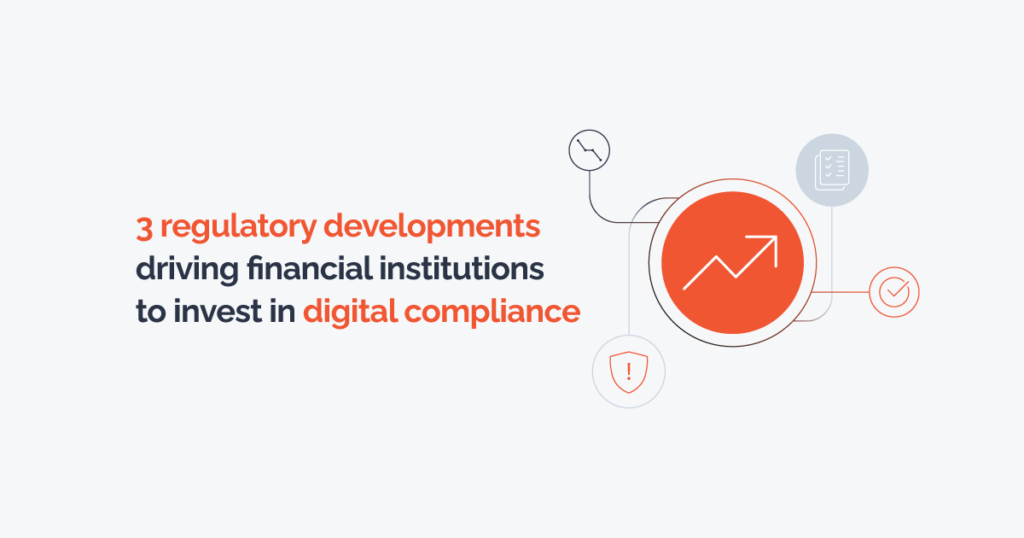
In this blog post, we explore three regulatory developments that come up in many of our conversations with customers and prospects. These are just three of the many developments that are driving financial institutions to evaluate and implement digital compliance solutions.
FINMA – Stricter expectations toward the management of cross-border risks in Switzerland
The Swiss Financial Market Supervisory Authority (FINMA) is revising its circular on the operational risks of banks, with consultations closing on July 11, 2022.
Through the revision FINMA is clarifying its supervisory practice with regard to the management of operational risks, particularly in connection with information and communication technology, handling critical data and cyber risks. Furthermore, requirements for operational resilience will be incorporated into the circular.
In one of its principles, FINMA specifies its expectations toward financial institutions providing services across borders. FINMA makes it more clear than ever that institutions or their group companies must record, limit and control the risks resulting from the provision of products and services across borders, and that it expects institutions to comply with foreign supervisory law.
This is in line with a 2010 position paper, in which FINMA made it clear that it believes that “it is essential for supervised institutions to conduct a thorough assessment of their cross-border financial services operations, examining the legal framework and associated risks” and that “in its capacity as supervisor, FINMA expects institutions to take due account of foreign supervisory legislation in particular, and to define a service model appropriate for each individual target market”.
These FINMA initiatives drive financial institutions to further invest in cross-border frameworks and specifically to look into efficient and effective solutions such as Apiax, covering crucial elements of robust cross-border frameworks such as digital country manuals to prepare client meetings or more efficient ways to conduct cross-border training.
FCA Consumer Duty – Higher consumer protection standards to be introduced in the United Kingdom
Following an extensive consultation period, the UK’s Financial Conduct Authority (FCA) announced the introduction of a new consumer protection duty to “ensure a higher and more consistent standard of consumer protection for users of financial services and help to stop harm before it happens”.
The FCA makes it clear that it wants to see “a higher level of consumer protection in retail financial markets, where firms compete vigorously in the interests of consumers”.
The new FCA Consumer Duty Rules require companies to achieve four outcomes: communicate more clearly; create products and services that are specifically designed to meet the needs of consumers; provide customer service that acts in consumers’ interests without undue hindrance; have prices of products and services represent fair value for consumers.
The FCA’s Chief Executive, Nikhil Rathi, told the Financial Times that this would be one of his agency’s top priorities in the coming years, with a much tougher set of requirements for regulated firms ensuring they act in their customer’s best interests.
The new FCA Consumer Duty Rules combine different issues and should lead to a completely new prioritisation of consumer interests. These changes will have an impact on a diverse set of business activities – from the rules governing investment suitability or the cross-border distribution of funds to pre-trade compliance checks and the creation of compliant marketing materials – and initiate further investments into digital compliance solutions such as Apiax.
New cryptocurrency regulations coming up around the world
As the use of cryptocurrencies increases, so do the global cryptocurrency regulations that have been put in place to govern them.
The Monetary Authority of Singapore has published new guidelines on the provision of digital payment token services to the public. In Hong Kong, a new licensing regime for virtual asset service providers (VASPs) administered by the Securities and Futures Commission (SFC) is going to take effect from March 2023.
In the UK, the government has announced plans for legislation to address misleading crypto-asset promotions with the intention to bring cryptocurrency adverts into line with other financial advertising. In Switzerland, executive and legislative bodies work hand in hand to adapt existing financial regulations to cryptocurrencies in order to address their illegal use.
In our experience, financial institutions’ concerns about digital assets are not so much focused on new cryptocurrency regulations, but rather on the classification of digital assets from a regulatory point of view. Nonetheless, recent regulatory activity in the cryptocurrency space is definitely influencing the interest of financial institutions around the world, driving them to evaluate and implement digital compliance solutions.
The rationale to invest in digital compliance
Whether it is a robust cross-border framework, dealing with stricter customer protection rules, or correctly dealing with the rules governing digital assets – staying on top of all of these developments is massively facilitated by digital compliance solutions.
Compared to traditional compliance approaches, digital compliance makes it easy to govern, validate, audit, distribute and consume compliance rules across entire organisations, turning regulatory knowledge into a scalable business enabler.

